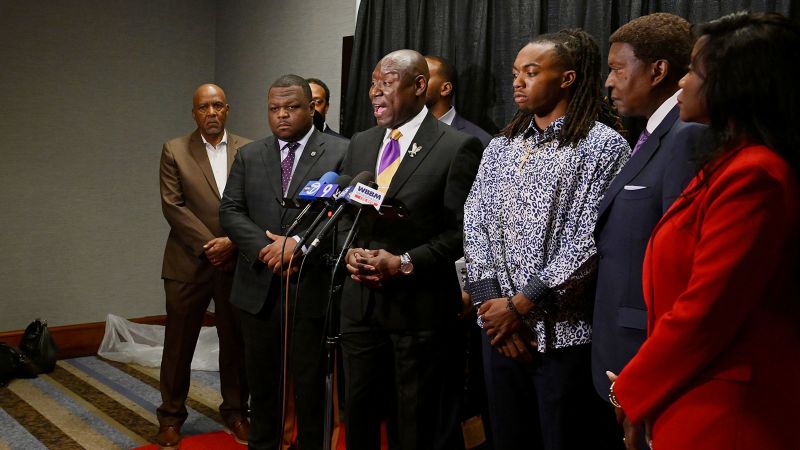Did Florida Officers Use Excessive Force Against a Black Student? Federal Lawsuit Filed

Published: 2025-09-10 19:38:08 | Category: World-Economy
This article examines the recent civil rights lawsuit filed against Jacksonville law enforcement following a disturbing incident involving a young Black college student, William McNeil. The lawsuit alleges police brutality and highlights broader issues of systemic racism and excessive force within the Jacksonville Sheriff’s Office.
Last updated: 25 October 2023 (BST)
Key Takeaways
- A 22-year-old Black college student, William McNeil, filed a federal lawsuit against Jacksonville law enforcement.
- The lawsuit claims police violated his civil rights during a traffic stop, leading to physical injuries.
- National outrage followed the viral video of the incident, prompting calls for a change in policing culture.
- Attorneys Ben Crump and Harry Daniels stress the need for accountability and systemic reform.
- The Jacksonville Sheriff’s Office has denied wrongdoing, with officials stating there are more details than captured in the viral footage.
The Incident: What Happened?
In February 2023, William McNeil was stopped by Officer D. Bowers of the Jacksonville Sheriff’s Office (JSO) for allegedly failing to turn on his headlights and buckle his seatbelt. Bowers claimed he was surveilling a property for suspected drug activity, which raised questions regarding the justification for the stop.
During the stop, McNeil reportedly requested a supervisor, questioning the legality of the officers' actions. The situation escalated quickly when Bowers ordered McNeil out of the vehicle, leading to a physical confrontation. Body camera footage later revealed that Bowers punched and dragged McNeil from his car, a violent act that has since been widely condemned. The incident was documented and shared widely on social media, igniting a wave of public outrage.
Legal Proceedings and Allegations
Following the incident, McNeil's attorneys filed a federal lawsuit against the officers involved, including Bowers and another officer, D. Miller, as well as the City of Jacksonville and Duval County government. The lawsuit alleges that the JSO fosters an environment that allows for racial profiling and excessive use of force without consequence.
Ben Crump, a prominent civil rights attorney known for representing victims of police violence, described the officers' actions as "unjustifiable, unnecessary, and unconstitutional." Crump's assertion underscores a growing concern regarding police conduct, particularly in communities of colour.
Prosecutors' Response
In August 2023, prosecutors announced they would not be pursuing charges against Officer Bowers, determining that his actions did not constitute a crime. This decision was met with criticism from McNeil’s legal team, who argued that the investigation was flawed and that Bowers' violent actions were unjustified, regardless of the circumstances.
The prosecutor's report indicated that Bowers issued multiple commands, which McNeil allegedly disobeyed. However, Crump contested this narrative, arguing that McNeil remained calm throughout the encounter while the officers failed to de-escalate the situation.
McNeil's Injuries and Aftermath
As a result of the confrontation, McNeil sustained serious physical injuries, including a laceration to his chin and lip, a fractured tooth, and was diagnosed with an ongoing traumatic brain injury. He has also developed symptoms akin to post-traumatic stress disorder (PTSD), such as nightmares and flashbacks regarding the incident.
The physical and psychological toll of such violence cannot be understated, and McNeil's case serves as a stark reminder of the potential consequences of excessive force during routine police encounters.
Calls for Accountability and Change
In light of this incident, McNeil’s legal team is not only seeking justice for their client but also aiming to instigate broader reform within the Jacksonville Sheriff’s Office. They have formally requested the Department of Justice to launch an independent investigation into the practices and policies of the JSO, particularly concerning excessive force and systemic failures in policing.
Many advocates for civil rights argue that systemic issues within law enforcement agencies often lead to similar incidents across the country. This case, they assert, is emblematic of a larger problem that needs urgent attention and reform.
Jacksonville Sheriff's Office Response
Jacksonville Sheriff T.K. Waters has publicly stated that there is more to the story than what the video depicts. He emphasised that McNeil was repeatedly asked to exit his vehicle, suggesting that the viral footage does not provide a comprehensive view of the situation. Waters’ comments highlight the ongoing tension between law enforcement narratives and public perceptions of police brutality.
The sheriff's office has opted not to comment further on the pending litigation, which may indicate a cautious approach as the legal proceedings unfold.
Systemic Issues in Policing
Advocates for police reform argue that the issues highlighted in McNeil’s case are symptomatic of broader systemic problems within law enforcement in the United States. Racial profiling, excessive use of force, and inadequate accountability measures contribute to a culture that can endanger the lives of individuals, particularly those from marginalised communities.
Calls for reform have gained momentum, especially in the wake of high-profile cases of police violence against Black individuals. Activists are demanding not only accountability for individual officers but also comprehensive changes to police training, policies, and community relations.
What Happens Next?
As the lawsuit progresses, it will likely involve extensive legal proceedings, including discovery, depositions, and possibly a trial. The outcome could have significant implications for McNeil, as well as for the Jacksonville Sheriff’s Office and its policies moving forward.
The legal team’s efforts to push for systemic change may also gain traction if they can successfully demonstrate patterns of misconduct within the JSO. This case thus serves as a crucial flashpoint in the ongoing discourse around police reform in the United States.
Conclusion
William McNeil's case sheds light on the urgent need for reform within law enforcement agencies, particularly regarding how they interact with communities of colour. As the lawsuit unfolds, it will be essential to monitor the developments closely, as they could set important precedents for civil rights protections and police accountability. What will this case reveal about the future of policing in America?
#CivilRights #PoliceReform #Jacksonville
FAQs
What prompted the lawsuit against Jacksonville law enforcement?
The lawsuit was filed after William McNeil was violently pulled from his car and beaten during a traffic stop, raising allegations of civil rights violations and excessive force by the officers involved.
Who are the main parties involved in the lawsuit?
The lawsuit names Officer D. Bowers, another officer D. Miller, Jacksonville Sheriff T.K. Waters, the City of Jacksonville, and Duval County government as defendants.
What injuries did William McNeil sustain?
William McNeil suffered a laceration to his chin and lip, a fractured tooth, and has been diagnosed with an ongoing traumatic brain injury, along with PTSD-like symptoms such as nightmares and flashbacks.
What has been the response from Jacksonville law enforcement?
Jacksonville Sheriff T.K. Waters stated that there is more to the story than the viral video and suggested that McNeil was repeatedly asked to exit his vehicle before the incident escalated.
What are the broader implications of this case?
This case may highlight systemic issues within the Jacksonville Sheriff’s Office and could lead to calls for comprehensive police reform and accountability measures within law enforcement agencies nationwide.



